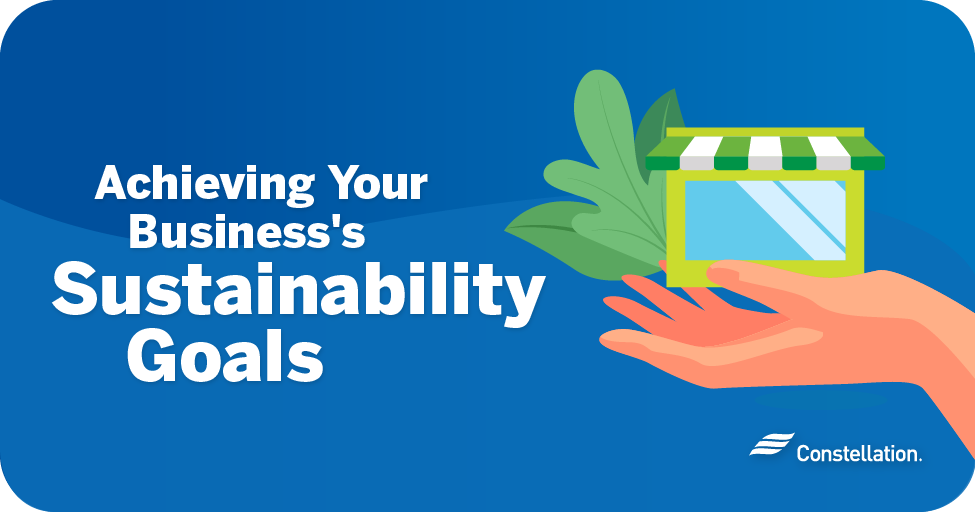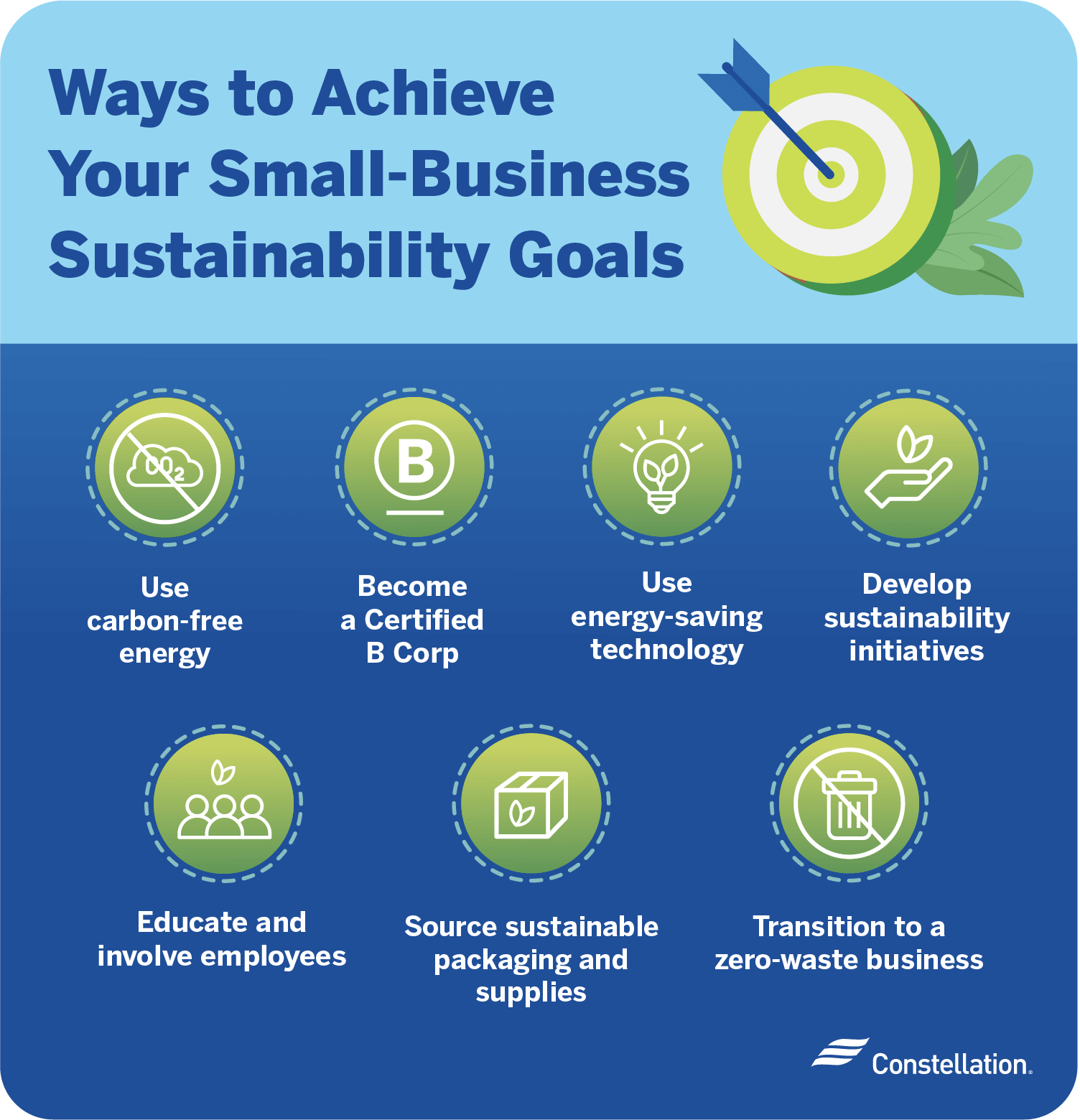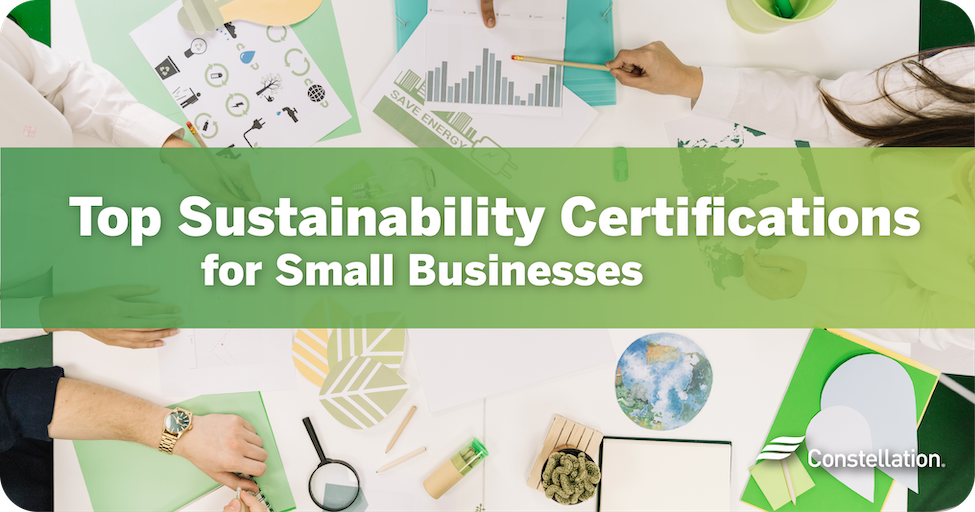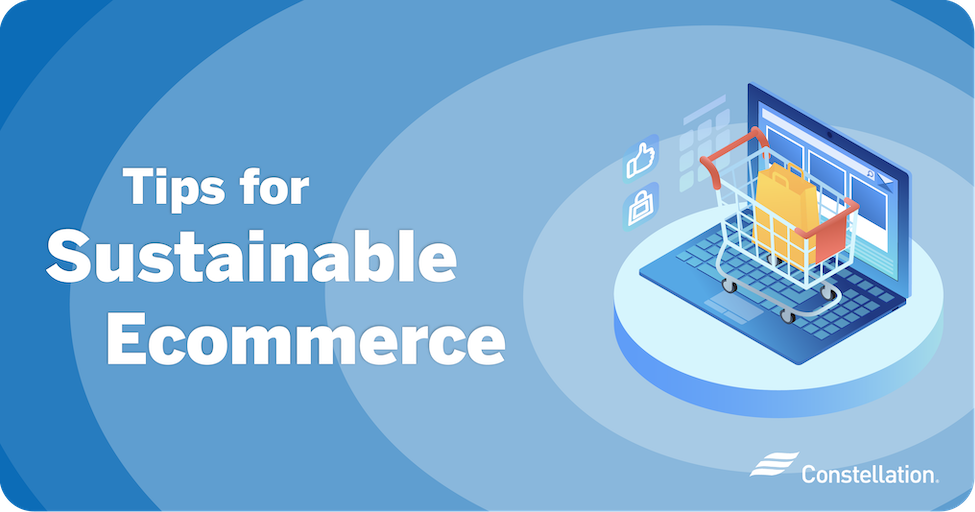
- Category:
Small Business Energy Savings -
Last updated:
September 9, 2022
How to Achieve Your Small Business’s Sustainability Goals
Environmental sustainability has become a core strategic driver in business today. Beyond helping the environment, setting small business sustainability goals and developing plans for achieving them can benefit your business. While every business is different, here are seven ideas for how to achieve sustainability goals for your company.
7 ways to help achieve your small-business sustainability goals
- Consider using carbon-free energy for your small business
- Get certified and become a B-Corp small business
- Use energy-saving technology for your small business
- Develop and integrate sustainability initiatives
- Train your staff to become more sustainably conscious
- Source sustainable packaging and disposables
- Transition to a zero-waste business
Make the switch to carbon-free energy for your business
7 ways to help achieve your small-business sustainability goals
Attention to our environment and the role companies can play to better care for it is at an all-time high. In fact, companies without environmental sustainability goals stand out–and not in a good way. Customers, employees and communities have come to expect companies to play a part in conservation and lowering the use of fossil fuels. We share the following sustainability goals as examples for your small business.

1. Consider using carbon-free energy for your small business
Using carbon-free energy can dramatically reduce the carbon footprint of your business. Your commitment also helps increase market demand that can attract more investment in the industry.
Some carbon-free energy is renewable, meaning we do not consume fuel to create it. Solar, wind and hydro power are some examples of renewable energy sources. Nuclear energy is generated without burning fuels like coal, oil, or natural gas, so it is carbon-free, though not renewable.
If your business does not have ready access to carbon-free energy, you can use renewable energy certificates as an option for achieving your sustainability goals. When you buy them, you offset the electricity you use from non-renewable sources.
2. Get certified and become a B-Corp small business
Getting certified as a B Corporation is a relatively new option for companies wanting to run an environmentally friendly business. To qualify, companies must transform to be purpose-driven, with benefits for all stakeholders.
The process has an environmental sustainability component, but also measures how inclusive and equitable your business is. Companies with sustainability goals can build their reputations with consumers, business partners, employees and the community as they contribute to the greater good of all.
Does getting an environmental certification help a small business?
Getting other environmental certifications, like LEED (Leadership in Energy and Environmental Design) for your buildings, ENERGY STAR® or USDA Organic badges for your products or WasteWise for how your business handles garbage, can help bring attention to the achievements of your sustainability goals and environmentally friendly work practices.
3. Use energy-saving technology for your small business
You can lower your small business utility bills by using energy-saving technology and some common sense. You can turn off lights when you are not using them. Save energy when they are on by switching out inefficient incandescent bulbs with choices of LED vs. CFL bulbs.
Additional energy-saving innovations include everything from smart hubs to cool roofs. When adopting new technology and putting energy-saving tips into action, it is invaluable to measure how well you achieve your sustainability goals. Small-business energy efficiency tools help you quantify and track your progress.
4. Develop and integrate sustainability initiatives
The United Nations adopted seventeen sustainable development goals in 2015 that cover everything from ending poverty to protecting the planet. Your business, by adopting sustainability goals, can play a role in helping achieve them.
Learning about a clean environment and clean energy are ways to make progress on two important goals for the planet and your business. Your company can magnify its impact by forming sustainability partnerships with other organizations.
Benefits of small business sustainability partnerships
Working with other companies increases your ability to meet your sustainability goals, and offers even more benefits:
- Builds strategic relationships. Working together with other companies strengthens relationships in ways that improve all aspects of your business.
- Promotes idea sharing and education. These relationships bring new ideas, establish best practices and promote sharing.
- Raises brand awareness. Being known for your commitment to environmental sustainability brings positive attention to your company.
- Increases your profit margin. Studies consistently show people are willing to pay more for environmentally friendly products.
- Improves employee recruitment and retention. Employees want to be proud of where they work and want to play a role in bettering their communities and the environment.
5. Train your staff to become more sustainably conscious
While you can provide leadership and resources, the motivation for how to achieve sustainability goals must come from everyone on your team. Realistically achieving energy sustainability goals will depend on educating your workforce, getting them involved in generating ideas and encouraging them to put these ideas into action.
Thinking beyond employees, also reach out to engage customers in sustainability programs. When you include both employees and customers in your small business planning for growth, success and sustainability, you will see better results.
6. Source sustainable packaging and disposables
When customers and consumers understand your sustainability goals, they are likely to appreciate and support them, including paying higher prices. You might eliminate plastic bags, straws and bottles, even if your state or town does not regulate them. Adopting sustainable packaging makes your products easier to recycle and reduces the amount of waste you and your customers need to manage.
Examples of sustainable packaging that help a small business
Sustainable packaging is a way to save energy and reduce waste, which are important for companies with sustainability goals.
- Biodegradable materials. Packaging that is made from plant-based materials like paper will break down without leaving any toxins.
- Recyclable materials. Paper, metal, glass, and some plastics can be efficiently recycled for other uses.
- Reusable materials. Materials and designs that promote reuse and repurposing give a second life to your packaging. Consider adding a return deposit to get packaging back for cleaning and reuse.
7. Transition to a zero-waste business
Making your small businesses a zero waste organization takes some creativity. You can ask customers to bring their own containers and offer free or discounted refills. Try composting. Think beyond the current processes. Your strategy will likely include multiple tactics.
How can a small business strive to achieve zero-waste?
Achieving this sustainability goal will take time. These ideas will help you make steady progress.
- Generate a new income stream. Join the waste-to-worth movement by finding ways to sell your waste as an asset to other companies.
- Become part of the circular economy. By sharing, leasing, reusing, repairing, refurbishing and recycling your materials, they circle through the economy for as long as possible. You get maximum value from materials and reduce waste.
- Cut down on packaging. Can you reduce the size and number of materials used in your packaging? Take a creative look into how you can minimize packaging waste.
Constellation provides carbon-free energy for your small business
We hope these sustainability goals examples will get your company started down the path of contributing to better communities and environments. Constellation Energy is actively driving change in the markets to sustainable carbon-free energy. Consider us your partner in pursuing your small business sustainability goals.




